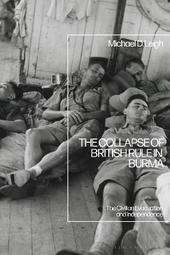
|
The Collapse of British Rule in Burma: The Civilian Evacuation and Independence
Paperback / softback
Main Details
| Title |
The Collapse of British Rule in Burma: The Civilian Evacuation and Independence
|
| Authors and Contributors |
By (author) Michael D. Leigh
|
| Physical Properties |
| Format:Paperback / softback | | Pages:304 | | Dimensions(mm): Height 234,Width 156 |
|
| Category/Genre | Asian and Middle Eastern history |
|---|
| ISBN/Barcode |
9781350147577
|
| Classifications | Dewey:959.104 |
|---|
| Audience | | Tertiary Education (US: College) | |
|---|
| Illustrations |
15 bw illus
|
|
Publishing Details |
| Publisher |
Bloomsbury Publishing PLC
|
| Imprint |
Bloomsbury Academic
|
| Publication Date |
23 January 2020 |
| Publication Country |
United Kingdom
|
Description
In May 1942 colonial Burma was in a state of military, economic and constitutional collapse. Japanese forces controlled almost the whole country and thousands of evacuees were trapped in a huge area of no-man's-land in the north. They made their way to India through the so-called 'jungles of death', attempting to trek out of Burma amidst perilous conditions. Drawing on diverse and previously unpublished accounts, Michael D. Leigh analyses the experiences of evacuees in both Burma and India and critically examines the impact of evacuation on colonial and Burmese politics in the lead-up to independence in 1948. This study will be of particular interest to students and scholars of Burmese history, 20th-century imperialism and the global reach of the Second World War.
Author Biography
Michael D. Leigh is Research Associate at SOAS, University of London, UK. He is the author of The Evacuation of Civilians from Burma: Analysing the 1942 Colonial Disaster (2014).
ReviewsLeigh has pulled together an impressive array of sources, both official and personal (including numerous recollections and images still in private possession), which he has sifted through with great diligence and skill ... [Leigh] has produced a ?ne work, rich in detail and persuasive in its presentation, to illustrate where and how the tragedy of the evacuation unfolded. This makes the book a valuable contribution to the study of the Second World War in the East. * South East Asia Research * The tormenting and breathtaking adventures of the thousands of people from British Burma recreated by Michael Leigh is truly an extraordinary story of the India-Burma-China theater of World War II, largely unknown to the current world. * Angelene Naw, Professor Emerita and Scholar in Residence, Judson University, USA * This is a compelling account of the destruction of British rule in Burma at the hands of the Japanese in the first months of 1942, of the evacuation of hundreds of thousands, Indians as well as Europeans, back to India in the wake of the collapse, and of the ultimately failed British attempt to re-establish effective control over Burma following the return of the colonial administration in mid-1945. Due weight is given to the politics of these events. But Michael Leigh's main focus is on the experience of individuals, from the highest levels of the colonial government, down through the middle ranks, to the vast numbers of the poorest Indians who had once found work in Burma. Meticulously researched and vividly written, this often harrowing account returns to history events and individuals far too long ignored or unknown. * Ian Brown, Emeritus Professor of the Economic History, SOAS, University of London, UK * With his engaging writing style and keen observations, Mike Leigh provided a rare account of the final days of the British rule in a remote corner of Burma. Chaos, cholera, death and human tragedy can teach us as important history lessons as wars and empire projects can, and Mike Leigh wonderfully brought out humanistic elements of the known past. A claim for a long mirror from a British elite evacuee tells as much important a story as a treaty. I hope this book will usher in more histories from below to do justice for the forgotten evacuees of the 1942 exodus, i.e. Indians and locals. * Tharapi Than, Associate Professor of Southeast Asian Studies, Northern Illinois University, USA *
|